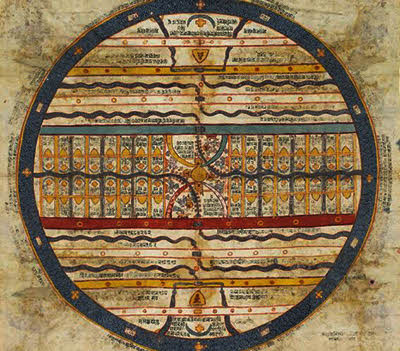
Now then there is a continent named Jambudvipa, enclosed by innumerable circles of Oceans and Deep’s on this earth and this dweep is surrounded by a diamond wall. It is adorned with rivers, zones, and mountains, and at its center, like a navel, stands Meru made of gold and jewels. It (Meru) is a lac of yojanas high, adorned with three terraces; and its peak, forty yojanas high, is adorned with shrines of the Arhats. To the west of it, in the Videhas there is a large city, Ksitipratisthita by name, an ornament to the whole earth. In it Prasannacandra was king, unwearied in works of Dharma, resembling the king of the gods, resplendent with great magnificence. Continue reading “The first Incarnation of Rishabhdev as the Merchant Dhana – Part 1” »
The first Incarnation of Rishabhdev as the Merchant Dhana – Part 1
Refutation of Maya – Part 4

Now, Svayambuddha felt disgust with the world at his Master’s death, took initiation under Sri Siddha Acharya, piously observed the vow for a long time without any transgressions, and became an Indrasamanika, named Drdhadharma, in Aisana. Inclined to affection like a kinsman because of their relations in the previous birth, and wise, he spoke to console Lalitanga. “Why are you bewildered on account of a mere woman, O noble sir? Wise men do not reach such a state even at death.” Lalitanga replied: “Friend, what are you saying? For death is easy to bear, but separation from a wife is very hard to bear, A gazelle eyed woman is the only thing of value in the world; without whom all wealth, even such, is valueless.” Continue reading “Refutation of Maya – Part 4” »
Seventh & Eighth Incarnation
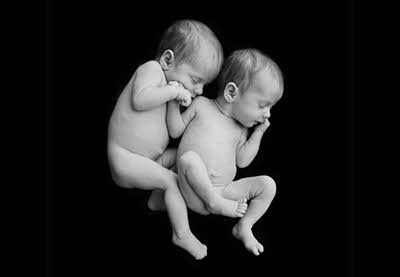
SEVENTH INCARNATION
In the seventh incarnation, they were born as twins in the Uttarakurus. Then they were born among the Uttarakurus as twins, for the same fate results to those who have died with the same thought. Continue reading “Seventh & Eighth Incarnation” »
The Doctrine of Maya (Vedanta)

Then the fourth minister said: “It is illusion; nothing is real. The visible world is like a dream or a mirage. A teacher and a disciple; a father and a son; virtue and vice; one’s own and another’s; such things as appear, that is only a form of expression, not reality. Continue reading “The Doctrine of Maya (Vedanta)” »
Ninth Incarnation as a physician Jivananda
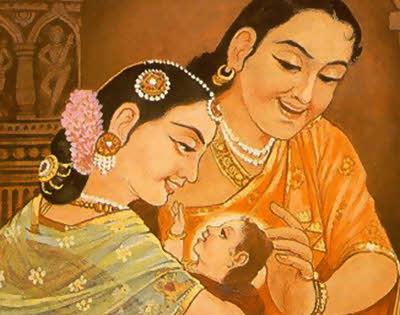
After he had enjoyed pleasures unceasingly, the soul of Vajrajangha fell from the exhaustion of his life-span, Just as a snow-ball melts in the sun. In Jambudvipa in the Videhas, in the city Ksitipratisthita, he was born as the son, named Jivananda, of the physician Suvidhi. At the same time in this city four other boys were born, like pieces of Dharma joined to bodies. Among them, one was the son, named Mahidhara, of King Isanacandra by his wife Kanakavati. Continue reading “Ninth Incarnation as a physician Jivananda” »
Refutation of Maya – Part 3
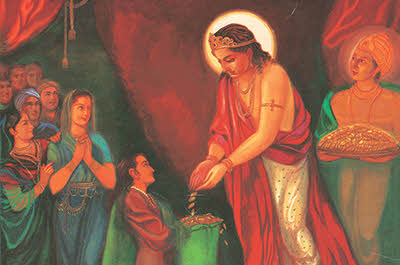
A drum sounded, making the heavens resound with its echoes, and Bards recited: “Hail! O Delight of the World,” etc. The palace, filled with the sounds of song and music and outcries of the Bards, thundered as it were with delight at the arrival of the lord. Then he, like one who had just arisen from sleep, seeing this, wondered: “Is this magic? Is it a dream? Is it illusion? What sort of thing is it? Are the singing, dancing, etc., for my benefit? Are these respectful people here for my benefit as their lord? How did I obtain this abode, luxurious, beautiful, enjoyable, pleasant, the abode of joy?” Continue reading “Refutation of Maya – Part 3” »
Sixth Incarnation as Vajrajangha – Part 2
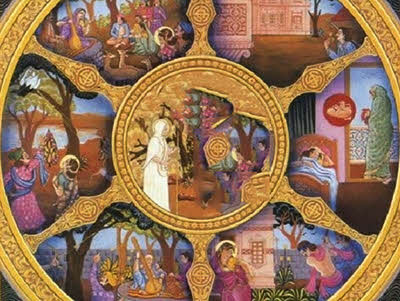
Just then Vajrajangha came from the city Lohargala, saw the events painted in the picture, and swooned. Fanned with fans, sprinkled with water, he got up. Recollection of his former birth took place, as if he had just come from heaven. Questioned by Pandita, “Why did you swoon, O Prince, when you saw this painting?” Vajrajangha said: “This painting is the life of my wife and myself in a former birth, madam. When I saw it, I fainted. This is the holy heaven Isana, and this the palace Sriprabha. Here am I named Lalitanga, and that is my wife, Svayamprabha. Here in Dhatakikhanda, having descended in Nandigrama, she, named Nirnamika, was born in the house of a poor man. Continue reading “Sixth Incarnation as Vajrajangha – Part 2” »
Sixth Incarnation as Vajrajangha – Part 1
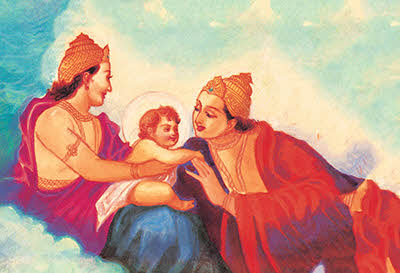
Then he was born as the son of King Suvarnajangha and Queen Laksmi in Jambudvipa,, in the East Videhas, near the Ocean on the north bank of the big river Sita, in the province Puskalavati, in the city Lohargala. Then with delight blossoming forth, on an auspicious day the happy parents gave him the name of Vajrajangha. In a short time Svayamprabha, afflicted by grief, devoted to works of Dharma, also fell like Lalitanga. In this same province in the city Pundarikini, she became the daughter of the Cakrin Vajrasena and his wife Gunavati. She was endowed with beauty surpassing all the world, and was named Srimati by her parents. Cared for by nurses like a creeper by women-gardeners, she grew up gradually, her body delicate and her hands like shining blossoms. As a jewel adorns a gold ring, youth adorned her making the sky blossom, as it were, with her glossy beauty. Continue reading “Sixth Incarnation as Vajrajangha – Part 1” »
Refutation of Maya – Part 1

Svayambuddha said: “If an object is not real, how can it be useful? If illusion is such, then why does not a dream elephant perform work? If the existence of cause and effect of objects is not considered real, then why are you afraid of a falling thunderbolt? That being as you say, you are not, I am not; there is no speech, and no speaker. How would the knowledge of the thing desired produce results?
Your Majesty, you are deceived by these learned in perverse arguments, themselves greedy for sense objects, constantly averse to future welfare. Relying on discernment, keep far away from sense objects. Rely only on Dharma, O Master, for happiness in this world and next.” Continue reading “Refutation of Maya – Part 1” »
Exposition of the Carvaka system (Materialist)
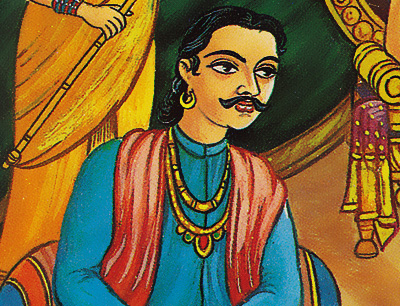
Then Sambhinnamati, like the night before the new moon, a heap of darkness of exceeding wrong belief, whose mind was like poison, said: “Well said! Well said! Svayambuddha. You desire the Master’s welfare, for intention is inferred from speech like food from vomiting. Only hereditary ministers like you, no others, speak thus for the pleasure of the Master who is always sincere and gracious. Continue reading “Exposition of the Carvaka system (Materialist)” »









